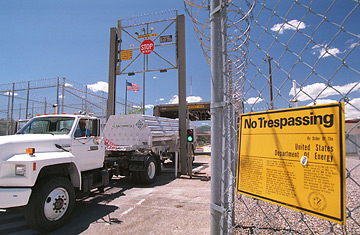
Los Alamos National Laboratory in Los Alamos, NM.
(2 of 2)
Smith reportedly told U.S, government investigators that he did not realize the nuclear weapons information he was passing around had been assigned a Secret Restricted Data (SRD) label—one of the highest possible classifications. "I can neither confirm nor deny that there was any investigation," he told TIME when reached by telephone at his California home.
The chairman of LANS, Gerald Parsky, is a current member and former chairman of the Board of Regents of the University of California, which has long played an important role in running Los Alamos. Parsky, a personal friend of President George W. Bush and his father, former President George H. W. Bush, has served as a political appointee in five Republican administrations and is a major G.O.P. donor.
Last week, Parsky was named chairman of the board of Lawrence Livermore National Security, LLC, after the group won a hotly contested bid over Northrup Grumman for a seven-year contract worth more than $1 billion to manage the Department of Energy's Lawrence Livermore National Laboratory in California.
Sources tell TIME that at least some of the board members at Los Alamos have received "security sensitivity training" in the aftermath of the Jan. 19 episode. But it's unclear whether any disciplinary or other actions may have been taken in addition to that mild step. Asked what Parsky had done to deal with the security incident set in motion by a consultant to his own board, a LANS spokesman had no comment. "Due to long-standing laboratory policy, as well as federal law, it is inappropriate to discuss any type of security matters, whether real or imagined," the spokesman told TIME.
A spokesperson for the Department of Energy in Washington said: "Safety and security are of paramount importance in carrying out the Department's mission and therefore, as with any instance of a potential violation of security procedures—whether it's done accidentally or not, these matters must be reported, details thoroughly investigated, and actions taken to correct them."
But Danielle Brian, executive director of the Project on Government Oversight, a non-partisan, non-profit group with long experience monitoring nuclear security, took a different view: "How can we expect Los Alamos, which has thousands of employees, to clean up its abysmal ongoing record of serious security breaches when members of its own board can't even keep track of their classified communications with each other?"
And those responsible for congressional oversight of nuclear security are likely to insist that when such breaches do occur, Capitol Hill should not be kept in the dark.
